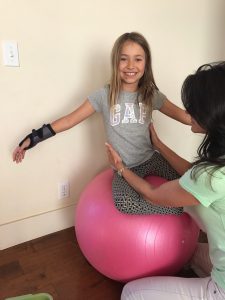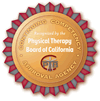Advanced Clinical Reasoning for Pediatric Upper Extremity Conditions
 The treatment of upper extremity pediatric conditions can be complex and challenging for therapists. Analyzing these conditions requires a good knowledge of development, anatomy and biomechanics to understand the underlying problems. In order to help the therapist plan and focus treatment, this course will outline a clinical problem solving framework that includes identifying the systems involved (skin, fascia, muscle, tendon, nerve, bone), defining the primary limiting factor(s), noting the developmental ramifications and addressing the resulting functional deficits.
The treatment of upper extremity pediatric conditions can be complex and challenging for therapists. Analyzing these conditions requires a good knowledge of development, anatomy and biomechanics to understand the underlying problems. In order to help the therapist plan and focus treatment, this course will outline a clinical problem solving framework that includes identifying the systems involved (skin, fascia, muscle, tendon, nerve, bone), defining the primary limiting factor(s), noting the developmental ramifications and addressing the resulting functional deficits.
Instructors will show how to use this framework to analyze, problem solve and plan treatment for various pediatric upper extremity diagnoses including distal hand conditions, orthopedic upper extremity trauma, neuromuscular involvement, sports injuries/overuse injuries and persistent pain/complex regional pain syndrome. Attendees will learn soft tissue treatment techniques, proximal handling techniques to gain distal motion, postural/core strength assessment & treatment, neuro-mobilization techniques, CRPS treatment techniques, and discuss appropriate use of casting/orthoses.
The course will use break out sessions, lab practice time, small group discussions of sample cases and quiz-show style questions and answers to facilitate new clinical reasoning skills for the attendees.
Required prerequisites: attendance at Pediatric Hand Therapy and Orthotic Intervention (Splinting) for Musculoskeletal Conditions (live onsite/in-person), Pediatric Hand Therapy and Orthotic Intervention for Musculoskeletal Conditions (hybrid online format) OR current experience with common pediatric hand conditions and a good working knowledge of UE anatomy.
You will be required to:
- bring along a yoga mat for participation in lab sessions.
- dress in comfortable, loose fitting clothing for mat work during lab sessions.
At the end of the course, the attendee will be able to:
- Identify one of the systems that may be contributing to the primary limiting factor for a patient diagnosed with sports/overuse injury
- Demonstrate 2 soft tissue mobilization techniques that would be appropriate for a patient diagnosed with orthopedic upper extremity trauma
- Demonstrate 2 movement strategies to help gain distal motion in a patient diagnosed with cerebral palsy
- List 2 treatment techniques that would be appropriate to utilize for a patient with camptodactyly.
- Given a case scenario, choose 3 treatment modalities to address persistent pain in a pediatric patient
- Identify 3 elbow issues that might interfere with gaining full motion after an elbow injury or fracture
- Identify a secondary problem and develop a treatment plan for a patient diagnosed with brachial plexus injury
Day One
| 7:30-8:00 | Registration/Continental Breakfast |
| 8:00-10:30 | Advanced clinical reasoning concept introduction: evaluation basics, systems identification & primary limiting factors (130 min lecture & 20 min. lab practice: Developmental ramifications) |
| 10:30 - 10:35 | Break |
| 10:30-12:30 | Anatomy/biomechanics of the upper extremity & composite movement patterns (85 min lecture & 20 min lab practice: Facilitation of simple composite movements) |
| 12:30-1:30 | Lunch on your own |
| 1:30 - 2:30 | Analyzing and advanced treatment for orthopedic trauma to the upper extremity (50 min lecture and 1 case scenario) |
| 2:30-3:30 | Analyzing and advanced treatment for soft tissue and scar restrictions (45 min lecture & 15 min demo and lab practice: Instrument assisted soft tissue mobilization) |
| 3:30-3:45 | Break |
| 3:45 - 5:00 | Analyzing distal hand conditions (50 min lecture & 10 min for 1 case scenario: identification of systems and limiting factors) |
Day Two
| 7:30 - 8:00 | Breakfast and Networking |
| 8:00-9:30 | Analyzing and advanced treatment for neuromuscular upper extremity conditions (90 min lecture) |
| 9:30-10:45 | Analyzing and advanced treatment for persistent pain and CRPS (complex regional pain syndrome) (65 min lecture & 10 min lab practice of pain management techniques) |
| 10:45-11:00 | Break |
| 11:00-12:15 | Analyzing sports injury/overuse conditions (55 min lecture & 20 min lab practice: Core assessment, kinetic chain & facilitation of complex composite movements) |
| 12:50 - 1:50 | Lunch |
| 1:50 -2:30 | Advanced clinical reasoning solidification (75 min small group discussion of 3 case scenarios) |
| 2:30-3:00 | Post-test game-show style quiz. Complete evaluation forms |
13 Contact Hours (13 clock hours)
This course is accepted by many professional credentialing organizations and state professional regulatory boards. Rules and regulations change frequently without notification, and apply differently to live and online courses. Please check with your state board to confirm accuracy of this list and acceptance of contact hours. Certificate of Attendance will be issued to all participants upon completion of the course and may be used for CEU verification of credits. CE credits vary by state. Please check with your state board/certifying agency to confirm conversion of contact hours to CE. See links below.
Rehab Education, LLC is recognized as:
- AOTA approved provider of OT and OTA continuing education (#6177).
- approved provider of PT and PTA continuing education by the NY State Education Department Board of Physical Therapy.
- approved provider of PT and PTA continuing education by IDFPR/ Illinois Board of Physical Therapy (#216000227).
- approved provider of PT and PTA continuing education by Oklahoma State Board of Medical Licensure & Supervision (BAP202310008).
This course is approved by:
 American Occupational Therapy Association (AOTA): Rehab Education, LLC is an AOTA Approved Provider of professional development. Provider # 6177. This live CE course is offered at 1.3 CEUs (13 clock hours) Intermediate level, OT Service Delivery. The assignment of AOTA CEUs does not imply endorsement of specific course content, products, or clinical procedures by AOTA or indicate AOTA approval of a certification or other professional recognition. (Course must be completed prior to 7/31/2025)
American Occupational Therapy Association (AOTA): Rehab Education, LLC is an AOTA Approved Provider of professional development. Provider # 6177. This live CE course is offered at 1.3 CEUs (13 clock hours) Intermediate level, OT Service Delivery. The assignment of AOTA CEUs does not imply endorsement of specific course content, products, or clinical procedures by AOTA or indicate AOTA approval of a certification or other professional recognition. (Course must be completed prior to 7/31/2025)
Arkansas Physical Therapy Association: This course has been approved by the Arkansas APTA for 13 contact hours. Approval #APTA-AR 2013
 Physical Therapy Board of California: The Physical Therapy Board of California recognizes Rehab Education, LLC as an approval agency to approve providers offering continuing competency courses for CA licensed PTs and PTAs. This course is approved for 13 contact hours.
Physical Therapy Board of California: The Physical Therapy Board of California recognizes Rehab Education, LLC as an approval agency to approve providers offering continuing competency courses for CA licensed PTs and PTAs. This course is approved for 13 contact hours.
Illinois State Board of Physical Therapy: Approved CE Sponsor by Illinois State Board of Physical Therapy, Division of Professional Regulations, Approval #216.000227. (Course must be taken prior to 09-30-2026)
NY State Physical Therapy Board: Rehab Education, LLC is recognized as an approved provider of PT and PTA continuing education by the NY State Education Department Board of Physical Therapy. (Course must be taken prior to 05-10-2025)
States that Accept AOTA Approval / PT State Boards’ Approval Reciprocity
The assignment of AOTA CEUs does not imply endorsement of specific course content, products, or clinical procedures by AOTA. At the time of listing, these states currently recognize AOTA Approved Providers for OT continuing education either in regulatory language or by formal written communication to AOTA. For an up-to-date list, see the AOTA website.
Alabama
Alaska
Arkansas
Arizona*
California
Delaware
District of Columbia
Florida **(self-report to CE Broker)Georgia*
Illinois
Indiana
Kentucky
Louisiana*
Maryland
Massachusetts
MichiganMinnesota
Mississippi*
Missouri
Montana
Nevada
New Hampshire
New Mexico
New YorkNorth Carolina
North Dakota
Ohio
Oregon
Oklahoma
Pennsylvania
Rhode IslandSouth Carolina*
South Dakota
Tennessee*
Texas
Vermont
Virginia
Wisconsin (self study courses only)
*see CE Broker
**FL licensees may need to self-submit courses in CE BrokerDisclaimer: Rehab Education LLC provides this list for your convenience. At the time of listing, the following state boards accept courses by virtue of approval by other organizations. It is the responsibility of the participant registering for a course to check with their state board to confirm rules and regulations regarding acceptance of contact hours for live and online courses.
The following PT Boards accept courses approved by other PT State boards*:
Alaska
Delaware
District of Columbia
Hawaii
IllinoisIndiana
Kansas
Kentucky
Michigan
MontanaNorth Carolina
North Dakota
Oregon
Pennsylvania
TennesseeUtah
Vermont
Virginia
Wyoming
The following PT Boards accept courses approved by other APTA state associations*:
Alaska
Arizona
Delaware
District of Columbia
Florida **(self-report to CE Broker)
GeorgiaKansas
Kentucky
Mississippi
Missouri
North Carolina
North DakotaRhode Island
South Dakota
Utah
Vermont
Virginia
Wyoming
The following PT Boards do not require pre-approval for continuing education activities as long as they are “directly related to the licensee’s practice of physical therapy” and/or meet the guidelines established by the board.
Alabama
Colorado
Connecticut
Iowa
New Hampshire
Washington
Wisconsin
HELPFUL LINKS:
*NBCOT…National Board for Certification of Occupational Therapy (view PDU requirements)+HTCC… Hand Therapy Certification Commission (view recertification requirements)
Hand Therapy Certification Commission (HTCC): This course is accepted by HTCC towards re-certification.

 American Occupational Therapy Association (AOTA): Rehab Education, LLC is an AOTA Approved Provider of professional development. Provider # 6177. This live CE course is offered at 1.3 CEUs (13 clock hours) Intermediate level, OT Service Delivery. The assignment of AOTA CEUs does not imply endorsement of specific course content, products, or clinical procedures by AOTA or indicate AOTA approval of a certification or other professional recognition. (Course must be completed prior to 7/31/2025)
American Occupational Therapy Association (AOTA): Rehab Education, LLC is an AOTA Approved Provider of professional development. Provider # 6177. This live CE course is offered at 1.3 CEUs (13 clock hours) Intermediate level, OT Service Delivery. The assignment of AOTA CEUs does not imply endorsement of specific course content, products, or clinical procedures by AOTA or indicate AOTA approval of a certification or other professional recognition. (Course must be completed prior to 7/31/2025) Physical Therapy Board of California: The Physical Therapy Board of California recognizes Rehab Education, LLC as an approval agency to approve providers offering continuing competency courses for CA licensed PTs and PTAs. This course is approved for 13 contact hours.
Physical Therapy Board of California: The Physical Therapy Board of California recognizes Rehab Education, LLC as an approval agency to approve providers offering continuing competency courses for CA licensed PTs and PTAs. This course is approved for 13 contact hours.